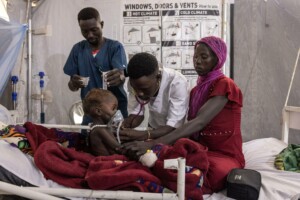Sudan OCHA bulletin 52: HAC issues amended directives and procedures
The Government of Sudan’s Humanitarian Aid Commission (HAC) issued on 25 December the amended directives and procedures regarding humanitarian action in Sudan.
HAC issues amended directives and procedures
The Government of Sudan’s Humanitarian Aid Commission (HAC) issued on 25 December the amended directives and procedures regarding humanitarian action in Sudan. The document introduces a number of new regulations on the work of humanitarian organisations in Sudan. This includes the following aspects of the humanitarian action: technical agreements, movement of aid personnel, partnerships with national NGOs, field teams and staffing, identification of humanitarian needs and publication of various reports on needs, assessments and related information, interaction with affected population and use of armed escorts.
Technical agreements
The amended directives provide a timeframe for the completion of the Technical Agreements (TAs) process. “TAs are to be reviewed and approved in 15 days or referred to the federal HAC for final adjudication. Following approval from relevant line ministry, state level HAC will approve or reject TAs within 15 days. After 15 days, TAs pending approval will be forwarded to federal HAC for prompt final adjudication. HAC will provide final review and adjudication for TAs within 5 working days”.
Travel permits for humanitarian personnel
“Travel Permits (TPs) are required only for active conflict areas identified by concerned authorities in coordination with the UN. TPs are not required for non-active conflict areas. Only in cases of active fighting and military operations will access be temporarily restricted and access will be managed through TPs. In all other areas, agencies will provide notification of travel to the HAC two working days ahead of travel”.
Partnership with national NGOs
“Humanitarian organisations (UN agencies, international organisations and national and international NGOs) determine national and other operational partners, based on technical and operational capacity across all sectors including protection, and other factors that impact quality of the humanitarian response, in coordination with the relevant humanitarian sectors and in accordance with the relevant domestic laws that uphold humanitarian principles of neutrality and independence”.
Field teams and staffing
“Humanitarian organisations (UN agencies, international organizations, and national and foreign organisations) determine the most suitable field teams and staffing, based on technical and operational concerns (including mandate, internal managerial consideration, technical expertise, gender balance considerations, and prevailing security conditions) across all sectors including protection, and other factors that impact quality of the response, in coordination with the relevant humanitarian sectors”.
Identification of humanitarian needs
“The default humanitarian approach in situations of new or evolving needs is to assess needs using a multi-disciplinary, inter-agency, and where possible, gender-balanced team covering all sectors, including protection. A multi-sector, inter-agency approach will best ensure that the needs of affected people are met in a comprehensive and appropriate manner. The Government of Sudan’s HAC will facilitate, coordinate, and expedite humanitarian assistance in cooperation with the UN Resident and Humanitarian Coordinator. The UN has a central and unique role to play in providing leadership and coordinating the efforts of the international community to support Sudan. Humanitarian partners will work to facilitate access and delivery of humanitarian assistance to those in need; enhance timely and impartial follow-up and assessment systems; ensure the participation of people affected by humanitarian systems in the design, implementation, and evaluation of humanitarian assistance activities; incorporate protection expertise into all inter- agency assessment and monitoring missions”.
Publication
“Humanitarian organisations are permitted to publicly report on humanitarian needs, assessments, and related information in consultation with the Government of Sudan. Humanitarian organisations commit to sharing information collected through assessments, monitoring, and programme implementation with the HAC, the UN, beneficiaries, and the public as necessary. Consultation with the Government of Sudan consists of agencies sharing an informational copy of reporting with the Government prior to publication”.
Interaction with affected population
“In collaboration with the concerned sectors, humanitarian organisations will verify new or evolving humanitarian needs through direct engagement with affected populations and using commonly recognised approaches and assessment tools and will collect information throughout the humanitarian program cycle”.
Use of armed escorts
“The use of armed escorts is a last resort to facilitate humanitarian access to conflict affected areas, and not standard practice for humanitarian operations”.
A survey launched in North Darfur to identify intentions of displaced people
On 24 December, HAC in North Darfur State together with the internally displaced persons (IDP) leaders—including women and youth—launched the start of the intention survey amongst IDPs in the state. At the launch, held in Abu Shouk IDP camp near El Fasher, capital of North Darfur, the Commissioner of El Fasher locality and the North Darfur HAC Commissioner highlighted that the exercise is voluntary and urged IDPs to actively participate in the survey. They stated that there are three options in the survey that the IDPs can choose: a) returning to their areas of origin; b) integrating into the current host community; and c) resettlement.
The Locality Commissioner assured the IDPs in the camp that an area in the northern part of the Abu Shouk camp has already been assigned to those who intend to integrate within the hosting community and all necessary arrangements will be made by the local authorities to assist the process.
The HAC North Darfur Commissioner added that HAC will coordinate and cooperate with humanitarian partners to ensure voluntariness/transparency and support required to implement the results of the survey. According to HAC, the survey will soon be conducted in all other IDP camps of North Darfur.
According to the Humanitarian Needs Overview (HNO) 2016, there are 2.6 million IDPs in Darfur, of whom 2 million are in need of humanitarian assistance.
About 2,500 returnees in Kaoura, North Darfur need essential household supplies
Between 15 and 20 December, a joint return verification mission by partners from the Recovery, Return and Reintegration (RRR) Sector and HAC North Darfur completed the return verification assessment mission in the Kaoura area and its surrounding villages in North Darfur’s Kebkabiya locality. The RRR sector was represented by the International Organization for Migration (IOM), the UN Refugee Agency (UNHCR) and the national NGO Kebkabiya Small Holders Charitable Society (KSCS). According to preliminary findings of the mission, about 2,500 people (489 families) have returned to nine villages mainly from Tawilla and Kebkabiya, while very few families were reported to have returned from Sortony.
The main reasons for returning to Kaoura, and surrounding areas, were identified as: unsatisfactory provision of assistance in IDP camps; the improved security situation in the area following the signing of an agreement between the Government and one of the Sudan Liberation Army/Abdul Wahid (SLA/AW) factions, returning to cultivate their land and seeking other livelihoods opportunities. Community leaders in Kaoura have stated their intention to permanently stay in their villages provided the security situation remains stable. The team recommended deploying an inter-agency assessment mission to the area in order to conduct an in-depth and detailed sectoral assessment. Additionally, the team recommended an urgent provision of essential non-food households items (NFIs) to the returnees.

World Bank renews support to IDPs and host communities in eastern Sudan
On 18 December, the World Bank launched the second phase of the Sustainable Livelihoods for Displaced and Vulnerable Communities in Eastern Sudan Project—funded by a US$4.435 million World Bank-managed grant from the State and Peacebuilding Fund (SPF)—to support IDPs and host communities in eastern Sudan’s Kassala State.
The project targets marginalised communities, with substantive socio-economic and environmental needs, who often risk falling under the radar. This will be accomplished by strengthening the capacity of local stakeholders, including state authorities, IDPs, and vulnerable host communities, to plan and implement improved livelihood and natural resource management practices.
The first phase of this project—from October 2013 to March 2016—was funded through a $3.08 million grant from the SPF. The project provided livelihood support to hundreds of vulnerable families in six IDP and host communities in Kassala. Families that had received livelihood assistance through this project increased their monthly income by an average 59.5 per cent.
Eastern Sudan is one of the poorest and arid parts of the country, is also a transit hub for migrants attempting to reach Europe via smuggling routes leading northwest into Libya, according to the World Bank.











 and then
and then